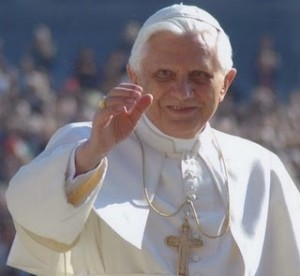USCCA14- Episode 14 – Â The Celebration of the Paschal Mystery of Christ
[powerpress]
Archbishop Lucas offers insights on the US Catholic Catechism for Adults Chapter 14:
Through the liturgical celebrations of the Church, we participate in the Paschal Mystery of Christ, that is, his passing thrugh death from this life into eternal flory, just as God enabled the people of ancient Israel to pass from slavery to freedom through the events narrated int he Book of Exodus (cf. Ex 11-13).  The liturgies of the Church also help to teach us about Jesus Christ and the meaning of the mysteries we are celebrating.
The Most Reverend George J. Lucas leads the Archdiocese of Omaha. Â
For other episodes in the visit our Archbishop George Lucas page
This programs is based on:
More information can be found here.
We wish to thank the USCCB for the permissions granted for use of  relevant material used in this series.
Also we wish to thank Denise Wharton and Bruce McGregor  for their vocal talents in this episode.
Tags: catholic, catholic podcast, catholic prayer, cathollc spirituality, George Lucas, liturgy, pascahl mystery, paschal mystery of christ, sacrament, united states catechism for adults
This entry was posted on Monday, June 11th, 2012 at 12:48 pm
You can follow any responses to this entry through the RSS 2.0 feed.
VATICAN CITY, 13 APR 2011 (VIS) – During this Wednesday’s general audiences, Benedict XVI concluded the cycle of catechesis he has dedicated over the course of two years to the many saints who “with their faith, with their charity and with their lives, have been beacons for many generations, and are thus also for us”.
“Often we are led to believe that sainthood is reserved to a few chosen ones”, the Pope said. Nonetheless, “saintliness, the fullness of Christian life, does not consist in the achievement of extraordinary feats, but in uniting oneself with Christ… in making His disposition … His behaviour … our own. … The II Vatican Council, in the Constitution of the Church, speaks clearly of the universal call to sainthood, affirming that no-one is excluded”.
However, a holy life, the Pope continued, “is not principally the result of our efforts, as it is God … who renders us holy, and it is the action of his Spirit which animates us from within, the same life of Christ resurrected which is communicated to us and which transforms us … Saintliness is therefore ultimately rooted in baptismal grace, in being introduced to the paschal mystery of Christ, by which His Spirit, His resurrected life, is communicated to us. … But God always respects our freedom and asks us to accept this gift and to live with the demands it brings, asks that we may allow ourselves to be transformed by the action of the Holy Spirit, conforming our will to the will of God”.
“How can it be that our way of thinking and our actions become the thought and action of Christ?”  asked the Pope. “Once again, the II Vatican Council offers us clear guidance; it tells us that Christian holiness is none other than charity, fully experienced”. However, in order that charity might, “like a good seed, grow in the soul and there bear fruit, the faithful must listen gladly to the Word of God and, by its grace, carry out His will through their works, participate frequently in the sacraments, above all the Eucharist and the Holy Liturgy; they must constantly apply themselves in prayer, in the abnegation of their selves, in the active service of their brothers and in the exercise of every virtue. … For this reason the true disciple of Christ is characterised by his charity both toward God and toward his neighbour”.
asked the Pope. “Once again, the II Vatican Council offers us clear guidance; it tells us that Christian holiness is none other than charity, fully experienced”. However, in order that charity might, “like a good seed, grow in the soul and there bear fruit, the faithful must listen gladly to the Word of God and, by its grace, carry out His will through their works, participate frequently in the sacraments, above all the Eucharist and the Holy Liturgy; they must constantly apply themselves in prayer, in the abnegation of their selves, in the active service of their brothers and in the exercise of every virtue. … For this reason the true disciple of Christ is characterised by his charity both toward God and toward his neighbour”.
“The Church, during the Liturgical Year, invites us to commemorate an array of saints who have fully lived in charity, and have loved and followed Christ in their everyday lives. They show us that it is possible to follow this path. … We are all called to saintliness: it is the very measure of Christian life”.
Benedict XVI concluded by inviting us all to open ourselves “to the action of the Holy Spirit, which transforms our life, so that we too may become tesserae in the great mosaic of sainthood that God creates throughout history”.
Tags: benedict xvi, catholic, catholic podcast, catholic prayer, cathollc spirituality, christian holiness, paschal mystery of christ
This entry was posted on Wednesday, April 13th, 2011 at 10:54 pm
You can follow any responses to this entry through the RSS 2.0 feed.


